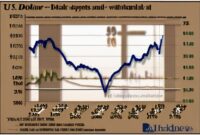Funds vs ETFs: Exchange traded funds (ETFs) and index funds are similar in many ways, but ETFs are considered easier to enter or exit. Investors can also buy ETFs that are smaller in size and have fewer hurdles than mutual funds.
The main point of the study
- Exchange-traded funds (ETFs) represent a basket of exchange-traded securities such as stocks.
- Mutual funds are worth only at the end of the day.
- Overall, ETFs have low costs and are tax efficient compared to comparable mutual funds.
Index of Investment Funds

Index funds are funds that represent the theoretical market segment. They are designed to act as the performance and structure of a financial market index. You can’t invest in the index itself, but you can invest in an index fund. Use a form of passive investing that sets rules that include stocks and then follow them without trying to beat stocks.
These types of funds track a benchmark index such as the Nasdaq 100 or S&P 500 index funds have lower costs and fees than actively managed funds.
People who are interested in investing in index funds typically do so through mutual funds designed to mimic the index.
Exchange Traded Funds (ETFs) .
ETFs are baskets of assets that trade like securities. They can be bought and sold on an open exchange like regular shares. Mutual funds are worth it at the end of the day.

Other differences between mutual funds and ETFs relate to the fees associated with each fund. There are generally no shareholder transaction costs for mutual funds. Most passive retail investors prefer index mutual funds to ETFs based on cost comparisons between the two. Passive institutional investors generally prefer ETFs.
Financial experts consider investing in index funds to be a relatively passive investment strategy compared to value investing.
Value investing often prefers investors who are eager and willing to wait for a bargain. Buying stocks at low prices increases your long-term profit opportunities. Investors are skeptical of the value of market indexes and generally avoid popular stocks in hopes of beating the market.
Freedom Group, LLC, Washington, DC Funds vs ETFs
An index fund is a type of investment fund that tracks a specific market index: the S&P 500, Russell 2000 or MSCI EAFE (hence the name). With no fundamental strategy, less active management is required and hence index funds have a lower cost structure than traditional mutual funds.

Although they also have a basket of assets, ETFs are more like stocks than mutual funds. They are listed as individual shares on market exchanges and are highly liquid: they can be bought and sold as shares throughout the trading day, with prices constantly changing. ETFs not only track an index, but also a sector, a commodity or even another fund.
What is the difference between an ETF and an index fund?
The main difference between ETFs and index funds is that ETFs can be traded during the day and index funds can only be traded at a fixed price at the end of the trading day.
Do ETFs or index funds pay better?
Both ETFs and index funds have historically performed well. It can be wise to look at the total cost of each and compare them before deciding where to invest



